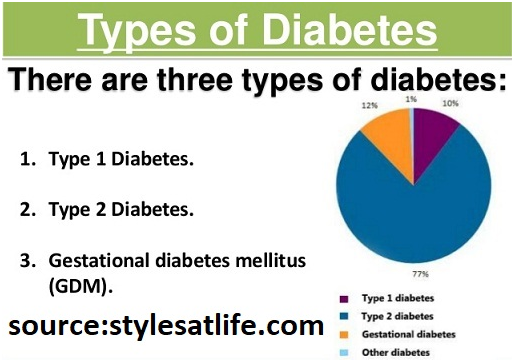Several people in Ghaziabad have Diabetes. They look for the most leading diabetes doctor in Ghaziabad. Do you also have diabetes? Don’t know which type of diabetes you have? Here, we have mentioned various types of diabetes. Continue reading learn more.
What is Diabetes Mellitus?
Diabetes mellitus, also known as diabetes, refers to a cluster of diseases that affect the way your body converts food into energy.
When you consume carbohydrates, your body turns it to glucose, a sugar that enters your bloodstream. Insulin is a hormone produced by your pancreas that assists the glucose to move from your bloodstream into your cells, where it gets utilized for energy.
When you do not get diabetes treatment, your body does not utilize insulin as efficiently as it should. A condition called high blood sugar takes place when redundant glucose stays within your blood. This condition can outcome in severe or life-threatening health issues.
Diabetes has no known cure. Yet, lifestyle changes and treatment can help you live a healthy and long life.
Diabetes manifests itself in various ways, based on its cause.
Prediabetes
When your blood sugar level is more than usual but not so much for your specialist to diagnose diabetes, you have prediabetes.
Prediabetes increases your risk of developing heart disease and type 2 diabetes. Exercising more and losing weight, even as little as five percent to seven percent of your weight, reduces such risks.
Type 1 Diabetes
Type 1 diabetes is known as Insulin-dependent diabetes as well. It was previously known as juvenile-onset diabetes, as it usually starts from childhood.
Diabetes type 1 is an autoimmune disease. When your body harms your pancreas, diabetes type 1 occurs. The organ gets damaged and no longer produces insulin.
Your genes can cause this diabetes type. Insulin-producing cells in your pancreas can also cause this issue.
Damage to tiny blood vessels in your nerves (diabetic neuropathy), eyes (diabetic retinopathy), and kidneys (diabetic nephropathy) can cause several health issues associated with type 1 diabetes. Individuals having type 1 diabetes are also more likely to develop stroke and heart disease.
For treating type 1, diabetes insulin needs to be injected into the fatty tissue just beneath your skin to treat. You can use:
- Syringes
- Insulin pens that utilize a thin needle along with prefilled cartridges
- Jet injectors that utilize high-pressure air to send an insulin spray via your skin
- Pumps that send insulin via a tube to a catheter beneath your belly skin
A test known as the A1C blood test evaluates your blood sugar levels over the last three months. Your specialist utilizes it to check how properly your blood sugar is managed. That assists them in determining your chances of complications.
If you have type 1 diabetes, you will have to adjust like:
- Frequently checking your blood sugar levels
- Taking insulin and other medicines as required
- Careful meal planning
- Daily exercise
Diabetes Type 2
Type 2 diabetes was previously known as adult-onset diabetes or non-insulin-dependent diabetes. However, it has become more prevalent in children and teenagers in the last twenty years, primarily due to more young people becoming obese or overweight. Around ninety percent of individuals with diabetes also have type 2.
Your pancreas typically produces some insulin when you have type 2 diabetes. Yet, either it is insufficient, or your body does not utilize it properly. Insulin resistance occurs when your cells do not respond to insulin. It most commonly affects liver, fat, and muscle cells.
Type 2 diabetes is usually less severe than type 1. However, it can still cause serious health problems, particularly in the tiny blood vessels that run through your eyes, kidneys, and nerves. Type 2 diabetes increases your chances of stroke and heart disease.
Obese people (those who are more than twenty percent over their ideal body weight for their height) are at more risk of type 2 diabetes and health issues following it. Insulin resistance is common in obese people, so the pancreas works harder to produce more insulin. Still, it is adequate for Keeping your blood sugar levels in the normal range.
Type 2 diabetes treatment entails maintaining a healthy weight, exercising, eating well. Few people require medicines as well.
Your specialist may perform an A1C test many times in a year to determine how well you have been managing your blood sugar.
Gestational Diabetes
Pregnancy often brings some Insulin resistance. It is known as gestational diabetes if this progresses to diabetes. Doctors usually detect it in the pregnancy’s middle or late stages. As a woman’s blood sugars pass through her placenta and into her baby, it is crucial to managing gestational diabetes to safeguard the baby’s development and growth.
As per doctors, Gestational diabetes affects two to ten percent of pregnancies. It usually goes away after the baby is born. However, up to ten percent of women with gestational diabetes develop type 2 diabetes weeks or years later.
The baby is more at risk from gestational diabetes than the mother. A baby may have an abnormal weight gain before birth. They may also have difficulty breathing at birth or have a higher risk of diabetes and obesity later on. A large baby may necessitate a cesarean section, or the mother may suffer damage to her heart, kidneys, nerves, or eyes.
Treatment for gestational diabetes involves:
- Carefully planned meals to ensure that you receive enough nutrients without consuming too many calories or fat.
- Exercise daily
- Keeping your weight gain in check
- If necessary, you may take insulin to manage your blood sugar levels.
Diabetes in Other Forms
Other medical conditions may be the cause of diabetes in one to five percent of individuals. Pancreatic diseases, medicines, certain surgeries, and infections are among them. Your doctor may want to monitor your blood sugar levels in these situations.


